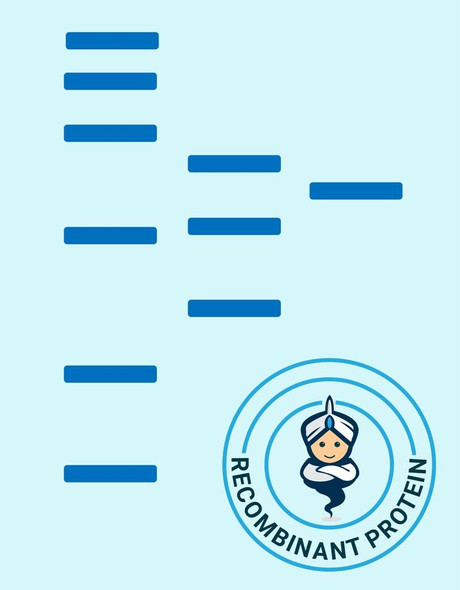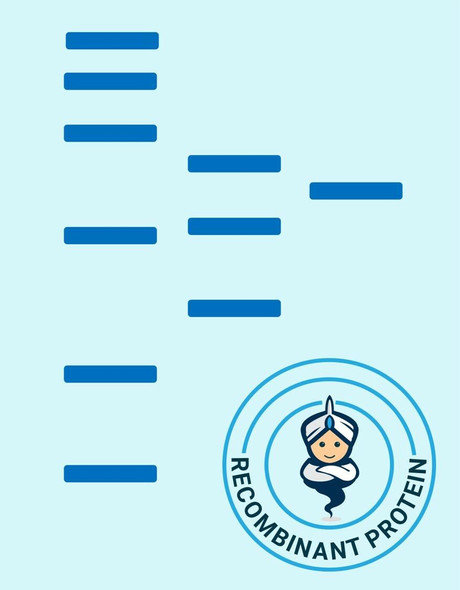Human KRAS 2B Recombinant Protein (RPPB3811)
- SKU:
- RPPB3811
- Product type:
- Recombinant Protein
- Size:
- 25ug
- Species:
- Human
- Target:
- KRAS 2B
- Synonyms:
- C-K-RAS
- K-RAS2A
- K-RAS2B
- K-RAS4A
- Source:
- Escherichia Coli
- Uniprot:
- P01116
Description
| Product Name: | Human KRAS 2B Recombinant Protein |
| Product Code: | RPPB3811 |
| Size: | 25µg |
| Species: | Human |
| Target: | KRAS 2B |
| Synonyms: | C-K-RAS, K-RAS2A, K-RAS2B, K-RAS4A, K-RAS4B, KI-RAS, KRAS1, NS3, RASK2, c-Ki-ras, GTPase KRas, Kirsten Rat Sarcoma Viral Oncogene, KRAS. |
| Source: | Escherichia Coli |
| Physical Appearance: | Sterile filtered colorless solution. |
| Formulation: | KRAS 2B Human solution containing 20mM Tris-HCl pH-8, 0.1M NaCl, 1mM DTT & 10% glycerol. |
| Stability: | Store at 4°C if entire vial will be used within 2-4 weeks. Store, frozen at -20°C for longer periods of time. For long term storage it is recommended to add a carrier protein (0.1% HSA or BSA).Avoid multiple freeze-thaw cycles. |
| Purity: | Greater than 90.0% as determined by SDS-PAGE. |
| Amino Acid Sequence: | MGSSHHHHHH SSGLVPRGSH MTEYKLVVVG AGGVGKSALT IQLIQNHFVD EYDPTIEDSY RKQVVIDGET CLLDILDTAG HEEYSAMRDQ YMRTGEGFLC VFAINNTKSF EDIHHYREQI KRVKDSEDVP MVLVGNKCDL PSRTVDTKQA QDLARSYGIP FIETSAKTRQ GVDDAFYTLV REIRKHKEKM SKDGKKKKKK SKTKC |
KRAS is part of the small GTPase superfamily. A single amino acid substitution is accountable for an activating mutation. KRAS participates in various malignancies, including lung adenocarcinoma, mucinous adenoma, ductal carcinoma of the pancreas and colorectal carcinoma.
KRAS 2B Recombinant human produced in E.Coli is a single, non-glycosylated polypeptide chain containing 205 amino acids (1-185 a.a.) and having a molecular mass of 23.2 kDa. The Human KRAS 2B is fused to a 20 amino acid His-Tag at N-terminus and purified by proprietary chromatographic techniques.
| UniProt Protein Function: | KRas: Ras proteins bind GDP/GTP and possess intrinsic GTPase activity. Interacts with PHLPP. Interacts (active GTP-bound form preferentially) with RGS14. Alternate between an inactive form bound to GDP and an active form bound to GTP. Activated by a guanine nucleotide-exchange factor (GEF) and inactivated by a GTPase- activating protein (GAP). Belongs to the small GTPase superfamily. Ras family. 2 isoforms of the human protein are produced by alternative splicing. |
| UniProt Protein Details: | Protein type:Oncoprotein; G protein; G protein, monomeric; G protein, monomeric, Ras; Motility/polarity/chemotaxis Chromosomal Location of Human Ortholog: 12p12.1 Cellular Component: extrinsic to internal side of plasma membrane; focal adhesion; mitochondrion; membrane; cytoplasm; plasma membrane; cytosol; lipid raft Molecular Function:protein binding; GDP binding; GTP binding; GMP binding; protein complex binding; LRR domain binding Biological Process: regulation of long-term neuronal synaptic plasticity; axon guidance; nerve growth factor receptor signaling pathway; activation of MAPKK activity; response to glucocorticoid stimulus; activation of NF-kappaB transcription factor; positive regulation of MAP kinase activity; small GTPase mediated signal transduction; positive regulation of cell proliferation; visual learning; negative regulation of neuron apoptosis; epidermal growth factor receptor signaling pathway; fibroblast growth factor receptor signaling pathway; cytokine and chemokine mediated signaling pathway; positive regulation of nitric-oxide synthase activity; MAPKKK cascade; social behavior; response to mineralocorticoid stimulus; regulation of synaptic transmission, GABAergic; positive regulation of Rac protein signal transduction; negative regulation of cell differentiation; Ras protein signal transduction; insulin receptor signaling pathway; innate immune response; striated muscle cell differentiation; positive regulation of protein amino acid phosphorylation; actin cytoskeleton organization and biogenesis; blood coagulation; vascular endothelial growth factor receptor signaling pathway; leukocyte migration Disease: Bladder Cancer; Gastric Cancer, Hereditary Diffuse; Pancreatic Cancer; Noonan Syndrome 3; Leukemia, Acute Myeloid; Lung Cancer; Breast Cancer; Schimmelpenning-feuerstein-mims Syndrome; Cardiofaciocutaneous Syndrome 2 |
| NCBI Summary: | This gene, a Kirsten ras oncogene homolog from the mammalian ras gene family, encodes a protein that is a member of the small GTPase superfamily. A single amino acid substitution is responsible for an activating mutation. The transforming protein that results is implicated in various malignancies, including lung adenocarcinoma, mucinous adenoma, ductal carcinoma of the pancreas and colorectal carcinoma. Alternative splicing leads to variants encoding two isoforms that differ in the C-terminal region. [provided by RefSeq, Jul 2008] |
| UniProt Code: | P01116 |
| NCBI GenInfo Identifier: | 131875 |
| NCBI Gene ID: | 3845 |
| NCBI Accession: | P01116.1 |
| UniProt Related Accession: | P01116 |
| Molecular Weight: | |
| NCBI Full Name: | GTPase KRas |
| NCBI Synonym Full Names: | KRAS proto-oncogene, GTPase |
| NCBI Official Symbol: | KRAS |
| NCBI Official Synonym Symbols: | NS; NS3; CFC2; RALD; K-Ras; KRAS1; KRAS2; RASK2; KI-RAS; C-K-RAS; K-RAS2A; K-RAS2B; K-RAS4A; K-RAS4B; c-Ki-ras2 |
| NCBI Protein Information: | GTPase KRas |
| UniProt Protein Name: | GTPase KRas |
| UniProt Synonym Protein Names: | K-Ras 2; Ki-Ras; c-K-ras; c-Ki-rasGTPase KRas, N-terminally processed |
| Protein Family: | GTPase |
| UniProt Gene Name: | KRAS |
| UniProt Entry Name: | RASK_HUMAN |










